2008年高考英语试题及参考答案(江苏卷)
- 格式:doc
- 大小:108.00 KB
- 文档页数:17
![2008年江苏高考英语试卷及讲解[1]](https://uimg.taocdn.com/85a3c53f01f69e31433294f7.webp)
2008年江苏高考英语试卷及讲解第二部分:英语语言知识运用(共三节,满分35分)第一节:单项选择(共15 小题;每小题1分,满分15分)请认真阅读下面各题,从题中所给的A、B、C、D四个选项中,选出可以填入空白处的最佳选项,并在答题卡上将该项涂黑。
例:It is generally considered unwise to give a child ______ he or she wants.A. howeverB. whateverC. whicheverD. whenever答案是B。
21. We went right round to the west coast by ______ sea instead of driving across ______ continent.A. the; theB.不填;theC. the; 不填D. 不填;不填【标准答案】B【试题分析】本题主要考查冠词用法。
第一空考查零冠词,在交通工具前不用冠词,如by air/by car等;第二空考查定冠词用法,定冠词用于名词之前,指世上独一无二的事物,如the sun, the sky, the moon, the earth等。
【高考考点】冠词用法。
【易错提醒】by the sea意为“在海边”,按题意来看,“我们”到西海岸是“坐船(by sea)”去的,所以排除A、C。
【备考提示】掌握好冠词,包括定冠词、不定冠、零冠词基本用法是解决此类问题的关键。
22. —Do you mind if I record your lecture?—______. Go ahead.A. Never mindB. No wayC. Not at allD. No. You’d better not【标准答案】C【试题分析】题意为:“-我录下您的演讲您介意吗?-不介意,录吧!”根据“Go ahead”可知对方同意了请求,所以说“不介意”。
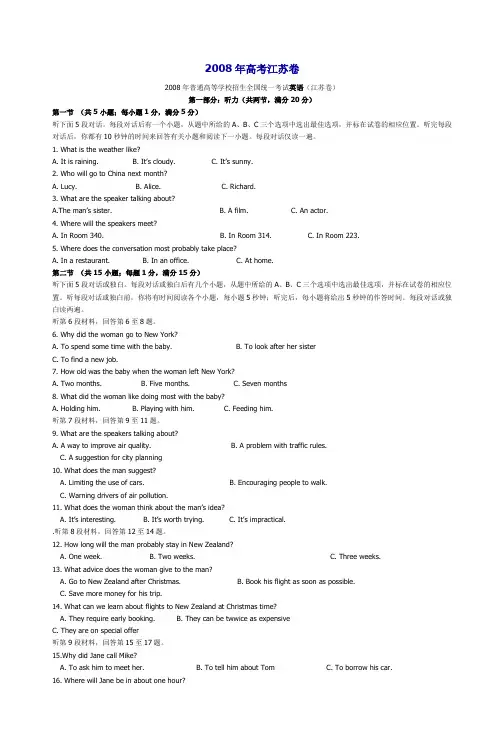
2008年高考江苏卷2008年普通高等学校招生全国统一考试英语(江苏卷)第一部分:听力(共两节,满分20分)第一节(共5小题;每小题1分,满分5分)听下面5段对话。
每段对话后有一个小题,从题中所给的A、B、C三个选项中选出最佳选项,并标在试卷的相应位置。
听完每段对话后,你都有10秒钟的时间来回答有关小题和阅读下一小题。
每段对话仅读一遍。
1. What is the weather like?A. It is raining.B. It‟s cloudy.C. It‟s sunny.2. Who will go to China next month?A. Lucy.B. Alice.C. Richard.3. What are the speaker talking about?A.The man‟s sister.B. A film.C. An actor.4. Where will the speakers meet?A. In Room 340.B. In Room 314.C. In Room 223.5. Where does the conversation most probably take place?A. In a restaurant.B. In an office.C. At home.第二节(共15小题;每题1分,满分15分)听下面5段对话或独白。
每段对话或独白后有几个小题,从题中所给的A、B、C三个选项中选出最佳选项,并标在试卷的相应位置。
听每段对话或独白前,你将有时间阅读各个小题,每小题5秒钟;听完后,每小题将给出5秒钟的作答时间。
每段对话或独白读两遍。
听第6段材料,回答第6至8题。
6. Why did the woman go to New York?A. To spend some time with the baby.B. To look after her sisterC. To find a new job.7. How old was the baby when the woman left New York?A. Two months.B. Five months.C. Seven months8. What did the woman like doing most with the baby?A. Holding him.B. Playing with him.C. Feeding him.听第7段材料,回答第9至11题。
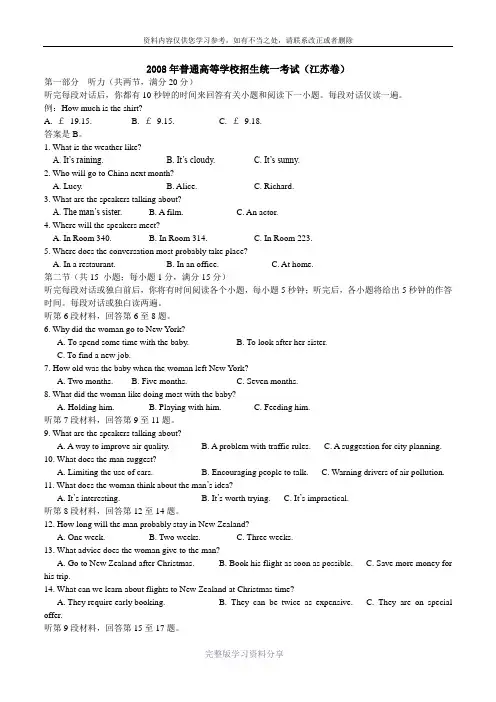
2008年普通高等学校招生统一考试(江苏卷)第一部分听力(共两节,满分20分)听完每段对话后,你都有10秒钟的时间来回答有关小题和阅读下一小题。
每段对话仅读一遍。
例:How much is the shirt?A. £19.15.B. £9.15.C. £9.18.答案是B。
1. What is the weather like?A. It’s raining.B. It’s cloudy.C. It’s sunny.2. Who will go to China next month?A. Lucy.B. Alice.C. Richard.3. What are the speakers talking about?A. The man’s sister.B. A film.C. An actor.4. Where will the speakers meet?A. In Room 340.B. In Room 314.C. In Room 223.5. Where does the conversation most probably take place?A. In a restaurant.B. In an office.C. At home.第二节(共15 小题;每小题1分,满分15分)听完每段对话或独白前后,你将有时间阅读各个小题,每小题5秒钟;听完后,各小题将给出5秒钟的作答时间。
每段对话或独白读两遍。
听第6段材料,回答第6至8题。
6. Why did the woman go to New York?A. To spend some time with the baby.B. To look after her sister.C. To find a new job.7. How old was the baby when the woman left New York?A. Two months.B. Five months.C. Seven months.8. What did the woman like doing most with the baby?A. Holding him.B. Playing with him.C. Feeding him.听第7段材料,回答第9至11题。
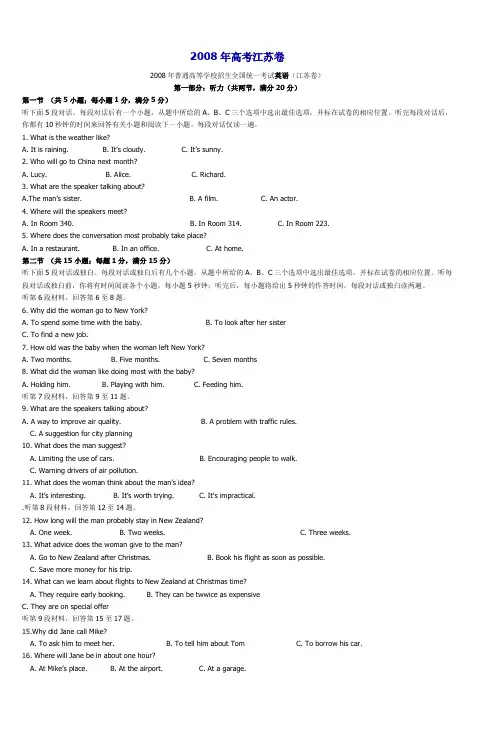
2008年高考江苏卷2008年普通高等学校招生全国统一考试英语(江苏卷)第一部分:听力(共两节,满分20分)第一节(共5小题;每小题1分,满分5分)听下面5段对话。
每段对话后有一个小题,从题中所给的A、B、C三个选项中选出最佳选项,并标在试卷的相应位置。
听完每段对话后,你都有10秒钟的时间来回答有关小题和阅读下一小题。
每段对话仅读一遍。
1. What is the weather like?A. It is raining.B. It‟s cloudy.C. It‟s sunny.2. Who will go to China next month?A. Lucy.B. Alice.C. Richard.3. What are the speaker talking about?A.The man‟s sister.B. A film.C. An actor.4. Where will the speakers meet?A. In Room 340.B. In Room 314.C. In Room 223.5. Where does the conversation most probably take place?A. In a restaurant.B. In an office.C. At home.第二节(共15小题;每题1分,满分15分)听下面5段对话或独白。
每段对话或独白后有几个小题,从题中所给的A、B、C三个选项中选出最佳选项,并标在试卷的相应位置。
听每段对话或独白前,你将有时间阅读各个小题,每小题5秒钟;听完后,每小题将给出5秒钟的作答时间。
每段对话或独白读两遍。
听第6段材料,回答第6至8题。
6. Why did the woman go to New York?A. To spend some time with the baby.B. To look after her sisterC. To find a new job.7. How old was the baby when the woman left New York?A. Two months.B. Five months.C. Seven months8. What did the woman like doing most with the baby?A. Holding him.B. Playing with him.C. Feeding him.听第7段材料,回答第9至11题。
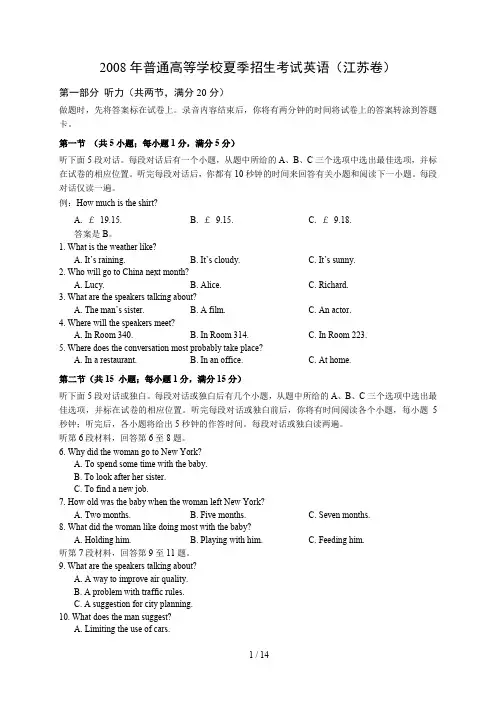
2008年普通高等学校夏季招生考试英语(江苏卷)第一部分听力(共两节,满分20分)做题时,先将答案标在试卷上。
录音内容结束后,你将有两分钟的时间将试卷上的答案转涂到答题卡。
第一节(共5小题;每小题1分,满分5分)听下面5段对话。
每段对话后有一个小题,从题中所给的A、B、C三个选项中选出最佳选项,并标在试卷的相应位置。
听完每段对话后,你都有10秒钟的时间来回答有关小题和阅读下一小题。
每段对话仅读一遍。
例:How much is the shirt?A. £19.15.B. £9.15.C. £9.18.答案是B。
1. What is the weather like?A. It’s raining.B. It’s cloudy.C. It’s sunny.2. Who will go to China next month?A. Lucy.B. Alice.C. Richard.3. What are the speakers talking about?A. The man’s sister.B. A film.C. An actor.4. Where will the speakers meet?A. In Room 340.B. In Room 314.C. In Room 223.5. Where does the conversation most probably take place?A. In a restaurant.B. In an office.C. At home.第二节(共15 小题;每小题1分,满分15分)听下面5段对话或独白。
每段对话或独白后有几个小题,从题中所给的A、B、C三个选项中选出最佳选项,并标在试卷的相应位置。
听完每段对话或独白前后,你将有时间阅读各个小题,每小题5秒钟;听完后,各小题将给出5秒钟的作答时间。
每段对话或独白读两遍。
听第6段材料,回答第6至8题。
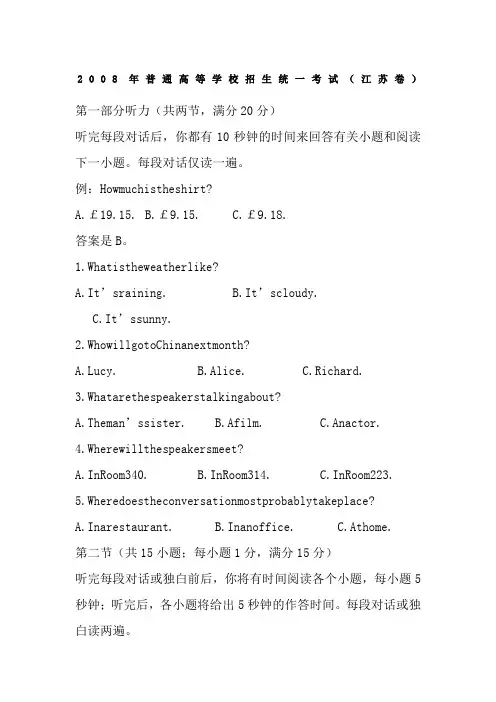
2008年普通高等学校招生统一考试(江苏卷)第一部分听力(共两节,满分20分)听完每段对话后,你都有10秒钟的时间来回答有关小题和阅读下一小题。
每段对话仅读一遍。
例:Howmuchistheshirt?A.£19.15.B.£9.15.C.£9.18.答案是B。
1.Whatistheweatherlike?A.It’sraining.B.It’scloudy.C.It’ssunny.2.WhowillgotoChinanextmonth?A.Lucy.B.Alice.C.Richard.3.Whatarethespeakerstalkingabout?A.Theman’ssister.B.Afilm.C.Anactor.4.Wherewillthespeakersmeet?A.InRoom340.B.InRoom314.C.InRoom223.5.Wheredoestheconversationmostprobablytakeplace?A.Inarestaurant.B.Inanoffice.C.Athome.第二节(共15小题;每小题1分,满分15分)听完每段对话或独白前后,你将有时间阅读各个小题,每小题5秒钟;听完后,各小题将给出5秒钟的作答时间。
每段对话或独白读两遍。
听第6段材料,回答第6至8题。
6.WhydidthewomangotoNewYork?A.Tospendsometimewiththebaby.B.Tolookafterhersister.C.Tofindanewjob.7.HowoldwasthebabywhenthewomanleftNewYork?A.Twomonths.B.Fivemonths.C.Sevenmonths.8.Whatdidthewomanlikedoingmostwiththebaby?A.Holdinghim.B.Playingwithhim.C.Feedinghim. 听第7段材料,回答第9至11题。
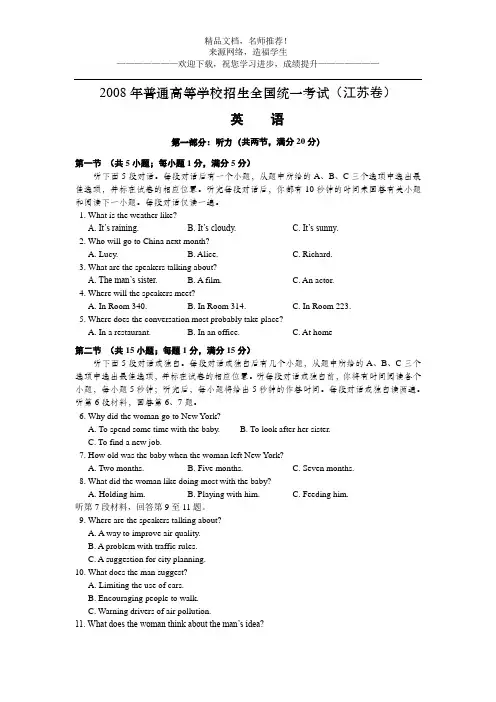
2008年普通高等学校招生全国统一考试(江苏卷)英语第一部分:听力(共两节,满分20分)第一节(共5小题;每小题1分,满分5分)听下面5段对话。
每段对话后有一个小题,从题中所给的A、B、C三个选项中选出最佳选项,并标在试卷的相应位置。
听完每段对话后,你都有10秒钟的时间来回答有关小题和阅读下一小题。
每段对话仅读一遍。
1. What is the weather like?A. It’s raining.B. It’s cloudy.C. It’s sunny.2. Who will go to China next month?A. Lucy.B. Alice.C. Richard.3. What are the speakers talking about?A. The man’s sister.B. A film.C. An actor.4. Where will the speakers meet?A. In Room 340.B. In Room 314.C. In Room 223.5. Where does the conversation most probably take place?A. In a restaurant.B. In an office.C. At home第二节(共15小题;每题1分,满分15分)听下面5段对话或独白。
每段对话或独白后有几个小题,从题中所给的A、B、C三个选项中选出最佳选项,并标在试卷的相应位置。
听每段对话或独白前,你将有时间阅读各个小题,每小题5秒钟;听完后,每小题将给出5秒钟的作答时间。
每段对话或独白读两遍。
听第6段材料,回答第6、7题。
6. Why did the woman go to New York?A. To spend some time with the baby.B. To look after her sister.C. To find a new job.7. How old was the baby when the woman left New York?A. Two months.B. Five months.C. Seven months.8. What did the woman like doing most with the baby?A. Holding him.B. Playing with him.C. Feeding him.听第7段材料,回答第9至11题。
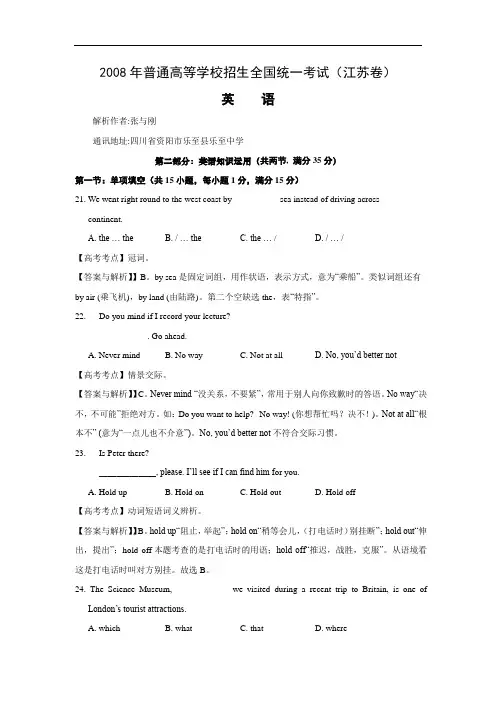
2008年普通高等学校招生全国统一考试(江苏卷)英语解析作者:张与刚通讯地址:四川省资阳市乐至县乐至中学第二部分:英语知识运用(共两节, 满分35分)第一节:单项填空(共15小题,每小题1分,满分15分)21. We went right round to the west coast by __________ sea instead of driving across _________continent.A. the … theB. / … theC. the … /D. / … /【高考考点】冠词。
【答案与解析】】B。
by sea是固定词组,用作状语,表示方式,意为“乘船”。
类似词组还有by air (乘飞机),by land (由陆路)。
第二个空缺选the,表“特指”。
22. --- Do you mind if I record your lecture?--- ___________. Go ahead.A. Never mindB. No wayC. Not at allD. No, you’d better not【高考考点】情景交际。
【答案与解析】】C。
Never mind “没关系,不要紧”,常用于别人向你致歉时的答语。
No way“决不,不可能”拒绝对方。
如:Do you want to help?--No way! (你想帮忙吗?决不!)。
Not at all“根本不” (意为“一点儿也不介意”)。
No, you’d better not不符合交际习惯。
23. --- Is Peter there?--- _____________, please. I’ll see if I can find him f or you.A. Hold upB. Hold onC. Hold outD. Hold off【高考考点】动词短语词义辨析。
【答案与解析】】B。
hold up“阻止,举起”;hold on“稍等会儿,(打电话时)别挂断”;hold out“伸出,提出”;hold off本题考查的是打电话时的用语;hold off“推迟,战胜,克服”。
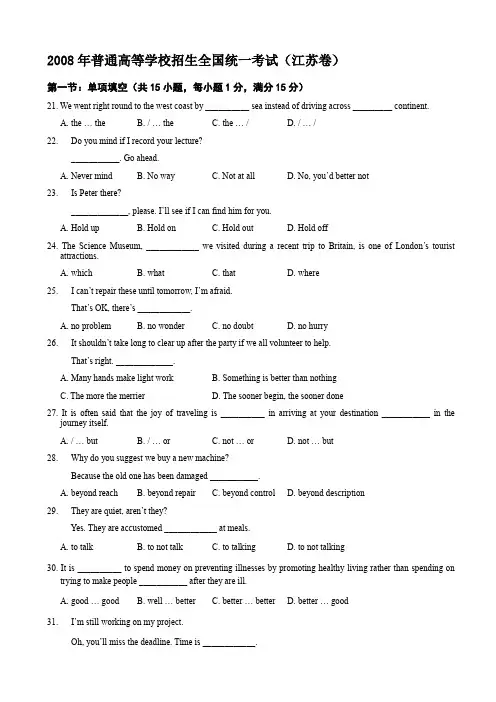
2008年普通高等学校招生全国统一考试(江苏卷)第一节:单项填空(共15小题,每小题1分,满分15分)21. We went right round to the west coast by __________ sea instead of driving across _________ continent.A. the … theB. / … theC. the … /D. / … /22. --- Do you mind if I record your lecture?--- ___________. Go ahead.A. Never mindB. No wayC. Not at allD. No, you’d better not23. --- Is Peter there?--- _____________, please. I’ll see if I can find him for you.A. Hold upB. Hold onC. Hold outD. Hold off24. The Science Museum, ____________ we visited during a recent trip to Britain, is one of London’s touristattractions.A. whichB. whatC. thatD. where25. --- I can’t repair these until tomorrow, I’m afraid.--- That’s OK, there’s ____________.A. no problemB. no wonderC. no doubtD. no hurry26. --- It shouldn’t take long to clear up after the party if we all volunteer to help.--- That’s right. _____________.A. Many hands make light workB. Something is better than nothingC. The more the merrierD. The sooner begin, the sooner done27. It is often said that the joy of traveling is __________ in arriving at your destination ___________ in thejourney itself.A. / … butB. / … orC. not … orD. not … but28. --- Why do you suggest we buy a new machine?--- Because the old one has been damaged ___________.A. beyond reachB. beyond repairC. beyond controlD. beyond description29. --- They are quiet, aren’t they?--- Yes. They are accustomed ____________ at meals.A. to talkB. to not talkC. to talkingD. to not talking30. It is __________ to spend money on preventing illnesses by promoting healthy living rather than spending ontrying to make people ___________ after they are ill.A. good … goodB. well … betterC. better … betterD. better … good31. --- I’m still working on my project.--- Oh, you’ll miss the deadline. Time is ____________.A. running outB. going outC. giving outD. losing out32. __________ you eat the correct foods ___________ be able to keep fit and stay healthy.A. Only if … will youB. Only if … you willC. Unless … will youD. Unless … you will33. --- I’m sure Andrew will win the first prize in the final.--- I think so. He ___________ for it for months.A. is preparingB. was preparingC. had been preparingD. has been preparing34. To learn English well, we should find opportunities to hear English ___________ as much as we can.A. speakB. speakingC. spokenD. to speak35. --- I’m sorry. I ___________ at you the other day.--- Forget it. I was a bit out of control myself.A. shouldn’t shoutB. shouldn’t have shoutedC. mustn’t shoutD. mustn’t have shouted第二节完形填空(共20小题;每小题1分,满分20分)Evelyn Glennie was the first lady of solo percussion in Scotland. In an interview, she recalled how she became a percussion soloist (打击乐器独奏演员) in spite of her disability.“Early on I decided not to allow the 36 of others to stop me from becoming a musician. I grew up on a farm in northeast Scotland and began 37 piano lessons when I was eight. The older I got, the more my passion (酷爱) for music grew. But I also began to gradually lose my 38 . Doctors concluded that the nerve damage was the 39 and by age twelve, I was completely deaf. But my love for music never 40 me.“My 41 was to become a percussion soloist, even though there were none at that time. To perform, I 42 to hear music differently from others. I play in my stocking feet and can 43 the pitch of a note (音调高低) by the vibrations (振动). I feel through my body and through my 44 . My entire sound world exists by making use of almost every 45 that I have.“I was 46 to be assessed as a musician, not as a deaf musician, and I applied to the famous Royal Academy of Music in London. No other deaf student had 47 this before and some teachers 48 my admission. Based on my performance, I was 49 admitted and went to 50 with the academy’s highest honours.“After that, I established myself as the first full-time solo percussionist. I 51 and arranged a lot of musical compositions since 52 had been written specially for solo percussionists.“I have been a soloist for over ten years. 53 the doctor thought a was totally deaf, it didn’t 54 that my passion couldn’t be realized. I would encourage people not to allow themselves to be 55 by others. Follow your passion; follow your heart, they will lead you to the place you want to go.”36. A. conditions B. opinions C. actions D. recommendations37. A. enjoying B. choosing C. taking D. giving38. A. sight B. hearing C. touch D. taste39. A. evidence B. result C. excuse D. cause40. A. left B. excited C. accompanied D. disappointed41. A. purpose B. decision C. promise D. goal42. A. turned B. learned C. used D. ought43. A. tell B. see C. hear D. smell44. A. carefulness B. movement C. imagination D. experience45. A. sense B. effort C. feeling D. idea46. A. dissatisfied B. astonished C. determined D. discouraged47. A. done B. accepted C. advised D. admitted48. A. supported B. followed C. required D. opposed49. A. usually B. finally C. possibly D. hopefully50. A. study B. research C. graduate D. progress51. A. wrote B. translated C. copied D. read52. A. enough B. some C. many D. few53. A. However B. Although C. When D. Since54. A. mean B. seem C. conclude D. say55. A. directed B. guided C. taught D. limited第三部分:阅读理解(共15小题,每题2分,满分30分)AWhat time is it? Most people are pretty accurate in their answer. And if you don’t know for sure, it’s a very likely that you can find out. There may be a watch on your wrist, there may be a clock on the wall, desk, or computer screen; or maybe you’re riding in a car that has a clock in the dashboard (仪表板).Even if you don’t have a timepiece of some sort nearby, your body keeps its own beat. Humans have an internal clock that regulates (调节) the beating of our heart, the pace of our breathing, the discharge (排出) of chemicals within our bloodstream, and many other bodily functions.Time is something from which we can’t escape. Even if we ignore it, it’s still going by, ticking away, second by second, minute by minute, hour by hour. So the main issue in using your time well is, “Who’s in charge?” We can allow time to slip by and let it be our enemy. Or we can take control of it and make it our ally.By taking control of how you spend your time, you’ll increase your chances of becoming a more successfulstudent. Perhaps more importantly, the better you are at managing the time you devote to your studies, the more time you’ll have to spend on your outside interests.The aim of time management is not to schedule every moment so we become slaves of a timetable that governs every waking moment of the day. Instead, the aim is to make informed choices as to how we use our time. Rather than letting the day go by, largely without our awareness, what we are going to discuss next can make us better able to control time for our own purposes.56. The underlined word “ally” in Para. 3 more likely means somebody or something that is _________.A. your slave and serves youB. your supporter and helps youC. under your control and obeys youD. under your influence and follows you57. The author intends to tell us that time _____________.A. could be regulated by a timepiece such as a clock or a watchB. could be managed by the internal clock of human bodiesC. should be well managed for our own interestD. should be saved for outside interests58. In the next part, the author would most probably discuss with you ________.A. how to keep up with the timesB. how to make up for lost timeC. how to have a good timeD. how to make good use of timeBWe experience different forms of the Sun’s energy every day. We can see its light and feel its warmth. The Sun is the major source of evaporation (蒸发) of water from the oceans and lakes. Sunlight also provides the energy used by green plants to make their own food. These green plants then provide food for all organisms (生物) on the Earth.Much of the energy that comes from the Sun never reaches the Earth’s surface. It is either reflected or absorbed by the gases in the upper atmosphere. Of the energy that reaches the lower atmosphere, 30% is reflected by clouds or the Earth’s surface. The remaining 70% warms the surface of the planet, causes water to evaporate, and provides energy for the water cycle and weather. Only a tiny part, approximately 0.023%, is actually used by green plants to produce food.Many gases found in the atmosphere actually reflect heat energy escaping from the Earth’s surface back to the Earth. These gases act like the glass of a greenhouse in that they allow energy from the Sun to enter but prevent energy from leaving. They are therefore called greenhouse gases.When sunlight strikes an object, some of the energy is absorbed and some is reflected. The amount reflected depends on the surface. For example, you’ve probably noticed how bright snow is when sunlight falls on it. Snow reflects most of the energy from the Sun, so it contributes to the low temperatures of winter. Dark-coloured surfaces, such as dark soil or forest, absorb more energy and help warm the surrounding air.59. According to the passage, the root cause for weather changes on the Earth is ______.A. the atmosphere surrounding the EarthB. water from oceans and lakesC. energy from the SunD. greenhouse gases in the sky60. Only a small part of the Sun’s energy reaches the Earth’s surface because most of it _______________.A. absorbed by the clouds in the lower atmosphereB. reflected by the gases in the upper atmosphereC. lost in the upper and lower atmosphereD. used to evaporate water from the oceans and lakes61. We learn from the passage that _______________.A. all living things on the Earth depend on the Sun for their foodB. a forest looks dark in winter because it absorbs solar energyC. only 0.023% of the energy from the Sun is made use of on the EarthD. greenhouse gases allow heat energy to escape from the Earth’s surfaceC62. When people come to visit the Gallery, they should ____________.A. leave all their carried items at the checkroomsB. have all their carried items x-rayed at the entranceC. take all their carried items with them without inspectionD. have all their carried items inspected at the entrance63. What does the Gallery feel sorry for?A. Visitors have to keep their valuable items in the checkrooms.B. The size of visitor items allowed into the Gallery is limited.C. It cannot keep oversized visitor items due to limited space.D. Visitor items over 17×26 inches must go through additional checks.64. Parents with small children visiting the Gallery _____________.A. can carry their children in soft front child carriersB. can carry their children on their shouldersC. can carry their children in child carriers worn on the backD. ought to pay if they want to use pushchairs for their children65. Visiting photographers should make sure that __________.A. pictures and videos are allowed for personal use anywhere in the GalleryB. pictures and videos can be taken in some places for personal useC. picture-taking and videoing are totally forbidden in the GalleryD. tripods are allowed except in some special exhibitionsDIt had been some time since Jack had seen the old man. College, carrier, and life itself got in the way. In fact, Jack moved clear across the country in pursuit of the dreams. There, in the rush of his busy life, Jack had little time to think about the past and often no time to spend with his wife and son. He was working on his future, and nothing could stop him.Over the phone, his mother told him, “Mr. Belser died last night. The funeral is Wednesday.” Memories fleshed through his mind like an old newsreel as he sat quietly remembering his childhood days.“Jack, did you hear me?”“Oh, sorry, Mom. Yes, I heard you. it’s been so long since I thought of him. I’m sorry, but I honestly thought he died years ago,” Jack said.“Well, he didn’t forget you. Every time I saw him he’d ask how you were doing. He’d reminisce (回忆) about the many days you spent over ‘his side of the fence’ as he put it, ” Mom told him.“I loved that old house he lived in,” Jack said.“You know, Jack, after your father died, Mr. Belser stepped in to make sure you had a man’s influence in your life,” she said.“He’s the one who taught me carpentry. I wouldn’t be in this business if it weren’t for him. He spent a lot of time teaching me things he thought were important. Mom, I’ll be there for the funeral.” Jack said.Busy as he was, he kept his word. Jack caught the next flight to his hometown. Mr. Belser’s funeral was small and uneventful. He had no children of his own, and most of his relatives had passed away.The night before he had to return home, Jack and his Mom stopped by to see the old house next door one more time, which was exactly as he remembered. Every step held memories. Every picture, every piece of furniture … Jack stopped suddenly.“What’s wrong, Jack?” his Mom asked.“The box is gone,” he said.“What box?” Mom asked.“There was a small gold box that he kept locked on top of his desk. I must have asked him a thousand times what was inside. All he’d ever tell me was ‘the thing I value most’,” Jack said.It was gone. Everything about the house was exactly how Jack remembered it, except for the box. He figured someone from the Belser family had taken it.“Now I’ll never know what was so valuable to him,” Jack said sadly.Returning to his office the next day, he found a package on his desk. The return address caught his attention.“Mr. Harold Belser” it read.Jack tore open the package. There inside was the gold box and an envelope. Jack’s hands shook as he read the note inside,“Upon my death, please forward this box and its contents to Jack Bernett. It’s the thing I valued most in my life.” A small key was taped to the letter. His heart racing, and tears filling his eyes. Jack carefully unlocked the box. There inside he found a beautiful gold pocket watch. Running his fingers slowly over the fine cover, he opened it.Inside he found these words carved: “Jack. Thanks for your time! Harold Belser.”“Oh. My God! This is the thing he valued most …”Jack held the watch for a few minutes, then called his assistant and cleared his appointments for the next two days. “Why?” his assistant asked.“I need some time to spend with my son,” he said.66. Why did Jack think Mr. Belser died years ago?A. College and career prevented him from remembering Mr. Belser.B. Jack was too busy with his business and family to think about Mr. Belser.C. Jack was too busy realizing his dreams to think about Mr. Belser.D. His present busy life washed away his children memories.67. Jack’s mother told him on the phone about Mr. Belser EXCEPT that _________.A. Mr. Belser often asked how Jack was doingB. Mr. Belser’s funeral would take place on WednesdayC. Mr. Belser had asked for Jack’s mailing addressD. Mr. Belser had pleasant memories of their time together68. Why did Belser send Jack his gold watch?A. Because he was grateful for Jack’s time with him.B. Because he had no children or relatives.C. Because he thought he had to keep his word.D. Because Jack had always wanted it during his childhood.69. Why did Jack say he needed some time to spend with his son?A. He was very tired of his work and wanted to have a good rest.B. He had promised to spare more time to stay with his son.C. He had missed his son and his family for days.D. He came to realize the importance of the time with his family.70. Which of the following is the most suitable title for this passage?A. The Good Old TimesB. What He Valued MostC. An Old Gold WatchD. The Lost Childhood Days第四部分:任务型阅读(共10小题,每小题1分,满分10分)请认真阅读下列短文,并根据所读内容在文章后表格中的空格里填入一个最恰当的单词。
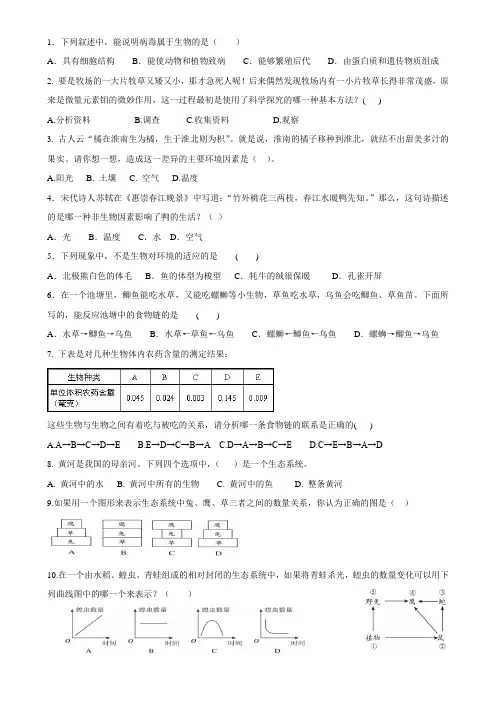
1.下列叙述中,能说明病毒属于生物的是()A.具有细胞结构B.能使动物和植物致病C.能够繁殖后代D.由蛋白质和遗传物质组成2. 要是牧场的一大片牧草又矮又小,那才急死人呢!后来偶然发现牧场内有一小片牧草长得非常茂盛,原来是微量元素钼的微妙作用,这一过程最初是使用了科学探究的哪一种基本方法?( )A.分析资料B.调查C.收集资料D.观察3. 古人云“橘在淮南生为橘,生于淮北则为枳”。
就是说,淮南的橘子移种到淮北,就结不出甜美多汁的果实。
请你想一想,造成这一差异的主要环境因素是()。
A.阳光B. 土壤C. 空气D.温度4.宋代诗人苏轼在《惠崇春江晚景》中写道:“竹外桃花三两枝,春江水暖鸭先知。
”那么,这句诗描述的是哪一种非生物因素影响了鸭的生活?()A.光B.温度C.水D.空气5.下列现象中,不是生物对环境的适应的是( )A.北极熊白色的体毛B.鱼的体型为梭型C.牦牛的绒很保暖D.孔雀开屏6.在一个池塘里,鲫鱼能吃水草,又能吃螺蛳等小生物,草鱼吃水草,乌鱼会吃鲫鱼、草鱼苗。
下面所写的,能反应池塘中的食物链的是( )A.水草→鲫鱼→乌鱼B.水草←草鱼←乌鱼C.螺蛳←鲫鱼←乌鱼D.螺蛳→鲫鱼→乌鱼7. 下表是对几种生物体内农药含量的测定结果:这些生物与生物之间有着吃与被吃的关系,请分析哪一条食物链的联系是正确的( )A.A→B→C→D→EB.E→D→C→B→AC.D→A→B→C→ED.C→E→B→A→D8. 黄河是我国的母亲河。
下列四个选项中,()是一个生态系统。
A. 黄河中的水B. 黄河中所有的生物C. 黄河中的鱼D. 整条黄河9.如果用一个图形来表示生态系统中兔、鹰、草三者之间的数量关系,你认为正确的图是()10.在一个由水稻、蝗虫、青蛙组成的相对封闭的生态系统中,如果将青蛙杀光,蝗虫的数量变化可以用下列曲线图中的哪一个来表示?()11.如图,当某种有毒物质进入生态系统后,生物体内有毒物质积累最多的是( ) A. ① B. ④ C. ② D. ⑤12.在明亮的光源下观察口腔上皮细胞临时装片时,为了更好地看清楚细胞的内部构造,下列选择中最好的搭配是A.大光圈、平面镜B.大光圈、凹面镜C.小光圈、凹面镜D.小光圈、平面镜13.用显微镜观察标本时,第一次使用5×目镜、10×物镜,第二次使用10×目镜、40×物镜,那么,第二次观察到的情况与第一次相比( )。
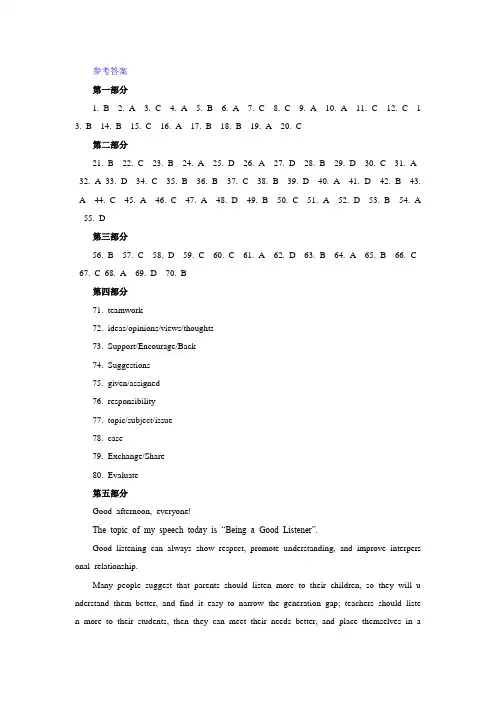
参考答案第一部分1.B2. A3. C4. A5. B6. A7. C8. C9. A 10. A 11. C 12. C 1 3. B 14. B 15. C 16. A 17. B 18. B 19. A 20. C第二部分21. B 22. C 23. B 24. A 25. D 26. A 27. D 28. B 29. D 30. C 31. A32. A 33. D 34. C 35. B 36. B 37. C 38. B 39. D 40. A 41.D 42. B 43.A 44. C 45. A 46. C 47. A 48. D 49.B 50.C 51. A 52.D 53. B 54. A55. D第三部分56.B 57. C 58. D 59. C 60. C 61. A 62. D 63. B 64. A 65. B 66. C 67. C 68. A 69. D 70. B第四部分71. teamwork72. ideas/opinions/views/thoughts73. Support/Encourage/Back74. Suggestions75.given/assigned76. responsibility77.topic/subject/issue78. case79.Exchange/Share80. Evaluate第五部分Good afternoon, everyone!The topic of my speech today is “Being a Good Listener”.Good listening can always show respect, promote understanding, and improve interpers onal relationship.Many people suggest that parents should listen more to their children, so they will u nderstand them better, and find it easy to narrow the generation gap; teachers should liste n more to their students, then they can meet their needs better, and place themselves in agood relationship with their students; students should listen more to their classmates, thus they will help and learn from each other, and a friendship is likely to be formed.What I want to stress is that each of us should listen more to others. Show your res pect and never stop others till they finish their talk; show you are interested by a support ive silence or a knowing smile; be open-minded to different opinions even though you do n’t like them. In a word, good listening can really enable us to get closer to each other.Thank you for your listening! (from )。
2008年普通高等学校招生统一考试(江苏卷)第一部分听力(共两节,满分20分)听完每段对话后,你都有10秒钟的时间来回答有关小题和阅读下一小题。
每段对话仅读一遍。
例:How much is the shirt?A. £19.15.B. £9.15.C. £9.18.答案是B。
1. What is the weather like?A. It’s raining.B. It’s cloudy.C. It’s sunny.2. Who will go to China next month?A. Lucy.B. Alice.C. Richard.3. What are the speakers talking about?A. The man’s sister.B. A film.C. An actor.4. Where will the speakers meet?A. In Room 340.B. In Room 314.C. In Room 223.5. Where does the conversation most probably take place?A. In a restaurant.B. In an office.C. At home.第二节(共15 小题;每小题1分,满分15分)听完每段对话或独白前后,你将有时间阅读各个小题,每小题5秒钟;听完后,各小题将给出5秒钟的作答时间。
每段对话或独白读两遍。
听第6段材料,回答第6至8题。
6. Why did the woman go to New York?A. To spend some time with the baby.B. To look after her sister.C. To find a new job.7. How old was the baby when the woman left New York?A. Two months.B. Five months.C. Seven months.8. What did the woman like doing most with the baby?A. Holding him.B. Playing with him.C. Feeding him.听第7段材料,回答第9至11题。
2008年全国普通高等学校招生统一考试(江苏卷)第二部分:英语知识运用第一节:单项选择21. B 解析:by sea是固定词组“乘船”, sea 前面不加冠词;后面的continent是特指他们穿过的那个大陆,因此前面要加定冠词。
22. C 解析:根据后面的go ahead可知,说话者同意(不介意)对方对其讲座进行录音,因此选C,即不介意。
23. B 解析:hold up “举起”Hold on “别挂电话” hold out “伸出” hold off “不使挨近(挡住,耽搁,离开)”。
显然只有B项符合题意,这句话的意思是,别挂电话,我去看看能否找到他。
24. A 解析:本题考查的重点是非限制性定语从句。
这里的which指代先行词the science museum,且在从句中作visited的宾语。
25. D 解析:no hurry意为“不忙,不必着急”,即安慰说话的人不要着急,明天完成是可以的。
其它几个不合题意——no problem (没问题),no wonder (怪不得),no doubt (无疑)26. A 解析:Many hands make light work.是谚语,意为“人多好办事”即我们说的众志成城。
符合题意。
题干中的第一句话的意思:如果晚会后我们大家都能自愿帮忙的话,那么很快就可以收拾好了。
别的不合题意。
27. D 解析:D项符合逻辑。
本题考查的是固定搭配not … but …这句话的意思是:人们常说,旅行的快乐不是在于到达目的地,而是在于路途的本身。
28. B 解析:beyond reach “够不着”,beyond repair是“无法修理”,Beyond control”无法控制”,beyond description“无法形容”。
根据前面的the old one has been damaged可知,旧的已经彻底毁坏了,所以无法修理了。
29. D 解析:be accused to 是固定词组,其中to是介词,后跟名词、代词或动名词作宾语。
2008年普通高等学校招生全国统一考试英语(江苏卷)第一部分:听力(共两节,满分20分)第一节(共5小题;每小题1分,满分5分)听下面5段对话。
每段对话后有一个小题,从题中所给的A、B、C三个选项中选出最佳选项,并标在试卷的相应位置。
听完每段对话后,你都有10秒钟的时间来回答有关小题和阅读下一小题。
每段对话仅读一遍。
例:How much is the shirt?A.£19.15B. £9.15C. £9.18答案是B1. What is the weather like?A. It’s raining.B. It’s cloudy.C. It’s sunny.2. Who will go to China next month?A. Lucy.B. Alice.C. Richard.3. What are the speakers talking about?A. The man’s sister.B. A film.C. An actor.4. Where will the speakers meet?A. In Room 340.B. In Room 314.C. In Room 223.5. Where does the conversation most probably take place?A. In a restaurant.B. In an office.C. At home第二节(共15小题;每题1分,满分15分)听下面5段对话或独白。
每段对话或独白后有几个小题,从题中所给的A、B、C三个选项中选出最佳选项,并标在试卷的相应位置。
听每段对话或独白前,你将有时间阅读各个小题,每小题5秒钟;听完后,每小题将给出5秒钟的作答时间。
每段对话或独白读两遍。
听第6段材料,回答第6、7题。
6. Why did the woman go to New York?A. To spend some time with the baby.B. To look after her sister.C. To find a new job.7. How old was the baby when the woman left New York?A. Two months.B. Five months.C. Seven months.8. What did the woman like doing most with the baby?A. Holding him.B. Playing with him.C. Feeding him.听第7段材料,回答第9至11题。
2008年普通高等学校招生全国统一考试(江苏卷)第一节:单项填空(共15小题,每小题1分,满分15分)21. We went right round to the west coast by __________ sea instead of driving across _________ continent.A. the … theB. / … theC. the … /D. / … /22. --- Do you mind if I record your lecture?--- ___________. Go ahead.A. Never mindB. No wayC. Not at allD. No, you’d better not23. --- Is Peter there?--- _____________, please. I’ll see if I can find him for you.A. Hold upB. Hold onC. Hold outD. Hold off24. The Science Museum, ____________ we visited during a recent trip to Britain, is one of London’s touristattractions.A. whichB. whatC. thatD. where25. --- I can’t repair these until tomorrow, I’m afraid.--- That’s OK, there’s ____________.A. no problemB. no wonderC. no doubtD. no hurry26. --- It shouldn’t take long to clear up after the party if we all volunteer to help.--- That’s right. _____________.A. Many hands make light workB. Something is better than nothingC. The more the merrierD. The sooner begin, the sooner done27. It is often said that the joy of traveling is __________ in arriving at your destination ___________ in thejourney itself.A. / … butB. / … orC. not … orD. not … but28. --- Why do you suggest we buy a new machine?--- Because the old one has been damaged ___________.A. beyond reachB. beyond repairC. beyond controlD. beyond description29. --- They are quiet, aren’t they?--- Yes. They are accustomed ____________ at meals.A. to talkB. to not talkC. to talkingD. to not talking30. It is __________ to spend money on preventing illnesses by promoting healthy living rather than spending ontrying to make people ___________ after they are ill.A. good … goodB. well … betterC. better … betterD. better … good31. --- I’m still working on my project.--- Oh, you’ll miss the deadline. Time is ____________.A. running outB. going outC. giving outD. losing out32. __________ you eat the correct foods ___________ be able to keep fit and stay healthy.A. Only if … will youB. Only if … you willC. Unless … will youD. Unless … you will33. --- I’m sure Andrew will win the first prize in the final.--- I think so. He ___________ for it for months.A. is preparingB. was preparingC. had been preparingD. has been preparing34. To learn English well, we should find opportunities to hear English ___________ as much as we can.A. speakB. speakingC. spokenD. to speak35. --- I’m sorry. I ___________ at you the other day.--- Forget it. I was a bit out of control myself.A. shouldn’t shoutB. shouldn’t have shoutedC. mustn’t shoutD. mustn’t have shouted第二节完形填空(共20小题;每小题1分,满分20分)Evelyn Glennie was the first lady of solo percussion in Scotland. In an interview, she recalled how she became a percussion soloist (打击乐器独奏演员) in spite of her disability.“Early on I decided not to allow the 36 of others to stop me from becoming a musician. I grew up on a farm in northeast Scotland and began 37 piano lessons when I was eight. The older I got, the more my passion (酷爱) for music grew. But I also began to gradually lose my 38 . Doctors concluded that the nerve damage was the 39 and by age twelve, I was completely deaf. But my love for music never 40 me.“My 41 was to become a percussion soloist, even though there were none at that time. To perform, I 42 to hear music differently from others. I play in my stocking feet and can 43 the pitch of a note (音调高低) by the vibrations (振动). I feel through my body and through my 44 . My entire sound world exists by making use of almost every 45 that I have.“I was 46 to be assessed as a musician, not as a deaf musician, and I applied to the famous Royal Academy of Music in London. No other deaf student had 47 this before and some teachers 48 my admission. Based on my performance, I was 49 admitted and went to 50 with the academy’s highest honours.“After that, I established myself as the first full-time solo percussionist. I 51 and arranged a lot of musical compositions since 52 had been written specially for solo percussionists.“I have been a soloist for over ten years. 53 the doctor thought a was totally deaf, it didn’t 54 that my passion couldn’t be realized. I would encourage people not to allow themselves to be 55 by others. Follow your passion; follow your heart, they will lead you to the place you want to go.”36. A. conditions B. opinions C. actions D. recommendations37. A. enjoying B. choosing C. taking D. giving38. A. sight B. hearing C. touch D. taste39. A. evidence B. result C. excuse D. cause40. A. left B. excited C. accompanied D. disappointed41. A. purpose B. decision C. promise D. goal42. A. turned B. learned C. used D. ought43. A. tell B. see C. hear D. smell44. A. carefulness B. movement C. imagination D. experience45. A. sense B. effort C. feeling D. idea46. A. dissatisfied B. astonished C. determined D. discouraged47. A. done B. accepted C. advised D. admitted48. A. supported B. followed C. required D. opposed49. A. usually B. finally C. possibly D. hopefully50. A. study B. research C. graduate D. progress51. A. wrote B. translated C. copied D. read52. A. enough B. some C. many D. few53. A. However B. Although C. When D. Since54. A. mean B. seem C. conclude D. say55. A. directed B. guided C. taught D. limited第三部分:阅读理解(共15小题,每题2分,满分30分)AWhat time is it? Most people are pretty accurate in their answer. And if you don’t know for sure, it’s a very likely that you can find out. There may be a watch on your wrist, there may be a clock on the wall, desk, or computer screen; or maybe you’re riding in a car that has a clock in the dashboard (仪表板).Even if you don’t have a timepiece of some sort nearby, your body keeps its own beat. Humans have an internal clock that regulates (调节) the beating of our heart, the pace of our breathing, the discharge (排出) of chemicals within our bloodstream, and many other bodily functions.Time is something from which we can’t escape. Even if we ignore it, it’s still going by, ticking away, second by second, minute by minute, hour by hour. So the main issue in using your time well is, “Who’s in charge?” We can allow time to slip by and let it be our enemy. Or we can take control of it and make it our ally.By taking control of how you spend your time, you’ll increase your chances of becoming a more successfulstudent. Perhaps more importantly, the better you are at managing the time you devote to your studies, the more time you’ll have to spend on your outside interests.The aim of time management is not to schedule every moment so we become slaves of a timetable that governs every waking moment of the day. Instead, the aim is to make informed choices as to how we use our time. Rather than letting the day go by, largely without our awareness, what we are going to discuss next can make us better able to control time for our own purposes.56. The underlined word “ally” in Para. 3 more likely means somebody or something that is _________.A. your slave and serves youB. your supporter and helps youC. under your control and obeys youD. under your influence and follows you57. The author intends to tell us that time _____________.A. could be regulated by a timepiece such as a clock or a watchB. could be managed by the internal clock of human bodiesC. should be well managed for our own interestD. should be saved for outside interests58. In the next part, the author would most probably discuss with you ________.A. how to keep up with the timesB. how to make up for lost timeC. how to have a good timeD. how to make good use of timeBWe experience different forms of the Sun’s energy every day. We can see its light and feel its warmth. The Sun is the major source of evaporation (蒸发) of water from the oceans and lakes. Sunlight also provides the energy used by green plants to make their own food. These green plants then provide food for all organisms (生物) on the Earth.Much of the energy that comes from the Sun never reaches the Earth’s surface. It is either reflected or absorbed by the gases in the upper atmosphere. Of the energy that reaches the lower atmosphere, 30% is reflected by clouds or the Earth’s surface. The remaining 70% warms the surface of the planet, causes water to evaporate, and provides energy for the water cycle and weather. Only a tiny part, approximately 0.023%, is actually used by green plants to produce food.Many gases found in the atmosphere actually reflect heat energy escaping from the Earth’s surface back to the Earth. These gases act like the glass of a greenhouse in that they allow energy from the Sun to enter but prevent energy from leaving. They are therefore called greenhouse gases.When sunlight strikes an object, some of the energy is absorbed and some is reflected. The amount reflected depends on the surface. For example, you’ve probably noticed how bright snow is when sunlight falls on it. Snow reflects most of the energy from the Sun, so it contributes to the low temperatures of winter. Dark-coloured surfaces, such as dark soil or forest, absorb more energy and help warm the surrounding air.59. According to the passage, the root cause for weather changes on the Earth is ______.A. the atmosphere surrounding the EarthB. water from oceans and lakesC. energy from the SunD. greenhouse gases in the sky60. Only a small part of the Sun’s energy reaches the Earth’s surface because most of it _______________.A. absorbed by the clouds in the lower atmosphereB. reflected by the gases in the upper atmosphereC. lost in the upper and lower atmosphereD. used to evaporate water from the oceans and lakes61. We learn from the passage that _______________.A. all living things on the Earth depend on the Sun for their foodB. a forest looks dark in winter because it absorbs solar energyC. only 0.023% of the energy from the Sun is made use of on the EarthD. greenhouse gases allow heat energy to escape from the Earth’s surfaceC62. When people come to visit the Gallery, they should ____________.A. leave all their carried items at the checkroomsB. have all their carried items x-rayed at the entranceC. take all their carried items with them without inspectionD. have all their carried items inspected at the entrance63. What does the Gallery feel sorry for?A. Visitors have to keep their valuable items in the checkrooms.B. The size of visitor items allowed into the Gallery is limited.C. It cannot keep oversized visitor items due to limited space.D. Visitor items over 17×26 inches must go through additional checks.64. Parents with small children visiting the Gallery _____________.A. can carry their children in soft front child carriersB. can carry their children on their shouldersC. can carry their children in child carriers worn on the backD. ought to pay if they want to use pushchairs for their children65. Visiting photographers should make sure that __________.A. pictures and videos are allowed for personal use anywhere in the GalleryB. pictures and videos can be taken in some places for personal useC. picture-taking and videoing are totally forbidden in the GalleryD. tripods are allowed except in some special exhibitionsDIt had been some time since Jack had seen the old man. College, carrier, and life itself got in the way. In fact, Jack moved clear across the country in pursuit of the dreams. There, in the rush of his busy life, Jack had little time to think about the past and often no time to spend with his wife and son. He was working on his future, and nothing could stop him.Over the phone, his mother told him, “Mr. Belser died last night. The funeral is Wednesday.” Memories fleshed through his mind like an old newsreel as he sat quietly remembering his childhood days.“Jack, did you hear me?”“Oh, sorry, Mom. Yes, I heard you. it’s been so long since I thought of him. I’m sorry, but I honestly thought he died years ago,” Jack said.“Well, he didn’t forget you. Every time I saw him he’d ask how you were doing. He’d reminisce (回忆) about the many days you spent over ‘his side of the fence’ as he put it, ” Mom told him.“I loved that old house he lived in,” Jack said.“You know, Jack, after your father died, Mr. Belser stepped in to make sure you had a man’s influence in your life,” she said.“He’s the one who taught me carpentry. I wouldn’t be in this business if it weren’t for him. He spent a lot of time teaching me things he thought were important. Mom, I’ll be there for the funeral.” Jack said.Busy as he was, he kept his word. Jack caught the next flight to his hometown. Mr. Belser’s funeral was small and uneventful. He had no children of his own, and most of his relatives had passed away.The night before he had to return home, Jack and his Mom stopped by to see the old house next door one more time, which was exactly as he remembered. Every step held memories. Every picture, every piece of furniture … Jack stopped suddenly.“What’s wrong, Jack?” his Mom asked.“The box is gone,” he said.“What box?” Mom asked.“There was a small gold box that he kept locked on top of his desk. I must have asked him a thousand times what was inside. All he’d ever tell me was ‘the thing I value most’,” Jack said.It was gone. Everything about the house was exactly how Jack remembered it, except for the box. He figured someone from the Belser family had taken it.“Now I’ll never know what was so valuable to him,” Jack said sadly.Returning to his office the next day, he found a package on his desk. The return address caught his attention.“Mr. Harold Belser” it read.Jack tore open the package. There inside was the gold box and an envelope. Jack’s hands shook as he read the note inside,“Upon my death, please forward this box and its contents to Jack Bernett. It’s the thing I valued most in my life.” A small key was taped to the letter. His heart racing, and tears filling his eyes. Jack carefully unlocked the box. There inside he found a beautiful gold pocket watch. Running his fingers slowly over the fine cover, he opened it.Inside he found these words carved: “Jack. Thanks for your time! Harold Belser.”“Oh. My God! This is the thing he valued most …”Jack held the watch for a few minutes, then called his assistant and cleared his appointments for the next two days. “Why?” his assistant asked.“I need some time to spend with my son,” he said.66. Why did Jack think Mr. Belser died years ago?A. College and career prevented him from remembering Mr. Belser.B. Jack was too busy with his business and family to think about Mr. Belser.C. Jack was too busy realizing his dreams to think about Mr. Belser.D. His present busy life washed away his children memories.67. Jack’s mother told him on the phone about Mr. Belser EXCEPT that _________.A. Mr. Belser often asked how Jack was doingB. Mr. Belser’s funeral would take place on WednesdayC. Mr. Belser had asked for Jack’s mailing addressD. Mr. Belser had pleasant memories of their time together68. Why did Belser send Jack his gold watch?A. Because he was grateful for Jack’s time with him.B. Because he had no children or relatives.C. Because he thought he had to keep his word.D. Because Jack had always wanted it during his childhood.69. Why did Jack say he needed some time to spend with his son?A. He was very tired of his work and wanted to have a good rest.B. He had promised to spare more time to stay with his son.C. He had missed his son and his family for days.D. He came to realize the importance of the time with his family.70. Which of the following is the most suitable title for this passage?A. The Good Old TimesB. What He Valued MostC. An Old Gold WatchD. The Lost Childhood Days第四部分:任务型阅读(共10小题,每小题1分,满分10分)请认真阅读下列短文,并根据所读内容在文章后表格中的空格里填入一个最恰当的单词。
2008年普通高等学校招生统一考试(江苏卷)第一部分听力(共两节,满分20分)听完每段对话后,你都有10秒钟的时间来回答有关小题和阅读下一小题。
每段对话仅读一遍。
例:HowmuchistheshirtA.£19.15.B.£9.15.C.£9.18.答案是B。
1.WhatistheweatherlikeA.It’sraining.B.It’scloudy.C.It’ssunny.2.WhowillgotoChinanextmonthA.Lucy.B.Alice.C.Richard.3.WhatarethespeakerstalkingaboutA.Theman’ssister.B.Afilm.C.Anactor.4.WherewillthespeakersmeetA.InRoom340.B.InRoom314.C.InRoom223.5.WheredoestheconversationmostprobablytakeplaceA.Inarestaurant.B.Inanoffice.C.Athome.第二节(共15小题;每小题1分,满分15分)听完每段对话或独白前后,你将有时间阅读各个小题,每小题5秒钟;听完后,各小题将给出5秒钟的作答时间。
每段对话或独白读两遍。
听第6段材料,回答第6至8题。
6.WhydidthewomangotoNewYorkA.Tospendsometimewiththebaby.B.Tolookafterhersister.C.Tofindanewjob.7.HowoldwasthebabywhenthewomanleftNewYorkA.Twomonths.B.Fivemonths.C.Sevenmonths.8.WhatdidthewomanlikedoingmostwiththebabyA.Holdinghim.B.Playingwithhim.C.Feedinghim.听第7段材料,回答第9至11题。
2008年江苏省高考英语听力材料录音稿(Text 1)M:I think it‟s going to rain.W: I guess so. The skies are dark and cloudy.(Text 2)M: Lucy is going back to China next month, Alice.W: Oh, really?M: And she will not meet Richer this time.(Text 3)W: I hate to say it. But Jacky isn‟t doing well in the film.M:Well. I think he‟s only playing a different type of role. My sister thinks he is still the best.(Text 4)M: Professor Miners, could I talk to you about my paper?W: Sure. Come to my office between two to three. It‟s Room 340.(Text 5)W: OK. Time to go home.M:I can‟t. I haven‟t finished the report about the newly opened restaurant.W:Well. If you carry on working like that, you‟ll make yourself ill.(Text 6)M:I haven‟t seen you for a long time. Where have you been?W: I went to New York to visit my sister and stayed there for two months. Actually, I really went to meet my new nephew.M:That‟s great! How old is he?W:Well. He was five months old when I got there. And he could possibly be the most beautiful baby I have ever seen.M:What did you do in your sister‟s home?W: I helped the baby and played with him a lot, which was nice. But what I enjoyed most was feeding him.(Text 7)M: Air pollution is so bad in this city. I think the government should stop people from driving cars on certain days.W: You have a point. Air pollution is a problem. But not letting people drive on certain days is a bad idea. People have to go to work by car.M:I‟m afraid I don‟t agree with you there. Reducing air pollution is really important. People are so used to driving that they don‟t think about ways to dothings. If we stop them from driving on certain days, maybe they could think of new ways to get around.W:I see your point. But I still think it would n‟t be possible to stop people from driving.(Text 8)M:Let‟s go and have lunch together.W:OK!M:By the way, I‟m thinking of going to New Zealand around Christmas for three weeks. It‟s such a beautiful country. I‟ve never been there before.W:Have you booked the flight?M:Not yet. I‟m planning to book my flight in two weeks‟ timeW:Book your flight right now.M:Why?W: Because the longer you leave it, the more expensive it will be. As a matter of fact, the prices may double at Christmas time. New Zealanders usually go home for Christmas.M:Then I‟m going to book my flight tomorrow morning.(Text 9)M: Hello!W:Hello, Mike! This is Jane.M:Oh. Hello, Jane!W:Listen, Mike! I‟ve got a real problem.M:What is it?W:The car‟s broken down.M:Oh, not again.W:Yeah. I checked the oil and I checked almost everything. It‟s just not starting at all.M: You have to get rid of it, you know.W:I know ,Iknow. But look, the thing is, I‟ve got to pick Tom up at the airport. Can I……?M: Use my car? Yes, of course.W: That‟ll be great! It‟s very kind of you.M: Come on when you like. I don‟t need it till tonight.W: OK! I‟ll be around in about an hour. Thanks a lot!M: It‟s all right. See you then!W: See you!(Text 10)W: OK! When we met last week, we talked about different kinds of short stories and somewell-known short story writers. I remember that many of you said you liked the American writer Earnest Hemingway, right? I hope you all followed my advice and finished reading his stor y “ A day‟s wait”, because as I said, we‟re going to study it together in today‟s lesson. Now since you‟re supposed to have read this story, let‟s have some discussion. Please look at the four questions on the blackboard. First, when and where does the story take place? Second, what does the boy read for in the storyand what kind of person does he show himself to be? Third, what kind of person is the boy‟s father? Four, what is the writer‟s main purpose of writing the story? I‟d like you to work in groups of four or five and present your answers in ten minutes. Is everything clear?2008年普通高等学校招生全国统一考试英语(江苏卷)第一部分:听力(共两节,满分20分)第一节(共5小题;每小题1分,满分5分)听下面5段对话。
2008高考试题及参考答案(江苏)第一部分听力(共两节,满分20分)第一节(共5小题;每小题1分,满分5分)听下面5段对话。
每段对话后有一个小题,从题中所给的A、B、C三个选项中选出最佳选项,并标在试卷的相应位置。
听完每段对话后,你都有10秒钟的时间来回答有关小题和阅读下一小题。
每段对话仅读一遍。
例:How much is the shirt?A.£19. 15.B.£9. 15.C.£9. 18.答案是B。
1. What is the weather like?A.I t‟s raining.B.It‟s cloudy.C.It‟s sunny.2. Who will go to China next month?A.Lucy.B.Alice.C.Richard.3. What are the speakers talking about?A.The man‟s sister.B.A film.C.An actor.4. Where will the speakers meet?A.In Room 340.B.In Room 314.C.In Room 223.5. Where does the conversation most probably take place?A.In a restaurant.B.In an office.C.At home.第二节(共15 小题;每小题1分,满分15分)听下面5段对话或独白。
每段对话或独白后有几个小题,从题中所给的A、B、C三个选项中选出最佳选项,并标在试卷的相应位置。
听完每段对话或独白前后,你将有时间阅读各个小题,每小题5秒钟;听完后,各小题将给出5秒钟的作答时间。
每段对话或独白读两遍。
听第6段材料,回答第6至8题。
6. Why did the woman go to New York?A.To spend some time with the baby.B.To look after her sister.C.To find a new job.7. How old was the baby when the woman left New York?A.Two months.B.Five months.C.Seven months.8. What did the woman like doing most with the baby?A.Holding him.B.Playing with him.C.Feeding him.听第7段材料,回答第9至11题。
9. What are the speakers talking about?A. A way to improve air quality.B. A problem with traffic rules.C. A suggestion for city planning.10. What does the man suggest?A.Limiting the use of cars.B.Encouraging people to talk.C.Warning drivers of air pollution.11. What does the woman think about the man‟s idea?A.It‟s interesting.B.It‟s worth trying.C.It‟s impractical.听第8段材料,回答第12至14题。
12. How long will the man probably stay in New Zealand?A.One week.B.Two weeks.C.Three weeks.13. What advice does the woman give to the man?A.Go to New Zealand after Christmas.B.Book his flight as soon as possible.C.Save more money for his trip.14. What can we learn about flights to New Zealand at Christmas time?A.They require early booking.B.They can be twice as expensive.C.They are on special offer.听第9段材料,回答第15至17题。
15. Why did Jane call Mike?A.To ask him to meet her.B.To tell him about Tom.C.To borrow his car.16. Where will Jane be in about one hour?A.At Mike‟s place.B.At the airport.C.At a garage.17. What can we infer from the conversation?A.Jane has just learned to drive.B.Jane‟s car is in bad condition.C.Mike will go to the airport.听第10段材料,回答第18至20题。
18. What did the speaker ask the students to do the week before?A.Write a short story.B.Prepare for the lesson.C.Learn more about the writer.19. Why does the speaker ask the questions?A.To check the students‟ understanding of the story.B.To draw the students‟ attention to reading skills.C.To let the students discuss father-son relationships.20. What will the students do in 10 minutes?A.Ask more questions. (from )B.Discuss in groups.C.Give their answers.第二部分:英语语言知识运用(共三节,满分35分)第一节:单项选择(共15 小题;每小题1分,满分15分)请认真阅读下面各题,从题中所给的A、B、C、D四个选项中,选出可以填入空白处的最佳选项,并在答题卡上将该项涂黑。
例:It is generally considered unwise to give a child ______he or she wants.A.howeverB.whateverC.whicheverD.whenever答案是B。
21. We went right round to the west coast by ______sea instead of driving across _ _____continent.A.the; theB.不填;theC.the; 不填D.不填;不填22. —Do you mind if I record your lecture?—______. Go ahead.A.Never mindB.No wayC.Not at allD.No. You‟d better not23. —Is Peter there?—______, please. I‟ll see if I can find him for you.A.Hold upB.Hold onC.Hold outD.Hold off24. The Science Museum, ______we visited during a recent trip to Britain, is one of London‟s tourist attractions.A.whichB.whatC.thatD.where25. —I can‟t repair these until tomorrow, I‟m afraid.—That‟s OK, there‟s ______.A.no problemB.no wonderC.no doubtD.no hurry26. —It shouldn‟t take long to clear up after the party if we all volunteer to help.—That‟s right.A.any hands make light workB.Something is better than nothingC.The more the merrierD.The sooner begun, the sooner done27. It is often said that the joy of traveling is ______in arriving at your destination ______in the journey itself.A.不填;butB.不填;orC.not; orD.not; but28. —Why do you suggest we buy a new machine?—Because the old one has been damaged ______.A.beyond reachB.beyond repairC.beyond controlD.beyond description29. —They are quiet, aren‟t they?—Yes. They are accustomed ______at meals.A.to talkB.to not talkC.to talkingD.to not talking30. It is ______to spend money on preventing illnesses by promoting healthy living rather than spending it trying to make people ______after they are ill. (from www.nmet1)A.good; goodB.well; betterC.better; betterD.better; good31. —I‟m still working on my project.—Oh, you‟ll miss the deadline. Time is ______.A.running outB.going outC.giving outD.losing out32. ______you eat the correct foods ______be able to keep fit and stay healthy.A.only if; will youB.Only if; you willC.Unless; will youD.Unless; you will33. —I‟m sure Andrew will win the first prize in the final.—I think so. He ______for it for months.A.is preparingB.was preparingC.had been preparingD.has been preparing34. To learn English well, we should find opportunities to hear English ______as m uch as we can.A.speak.B.speakingC.spokenD.to speak35. —I‟m sorry. I ______at you the other day.—Forget it. I was a bit out of control myself.A.shouldn‟t shoutB.shouldn‟t have shoutedC.mustn‟t shout C.mustn‟t have shouted第二节:完形填空(共20小题;每小题1分,满分20分)请认真阅读下面短文,从短文后各题所给的A、B、C、D四个选项中,选出最佳选项,并在答题卡上将该项涂黑。